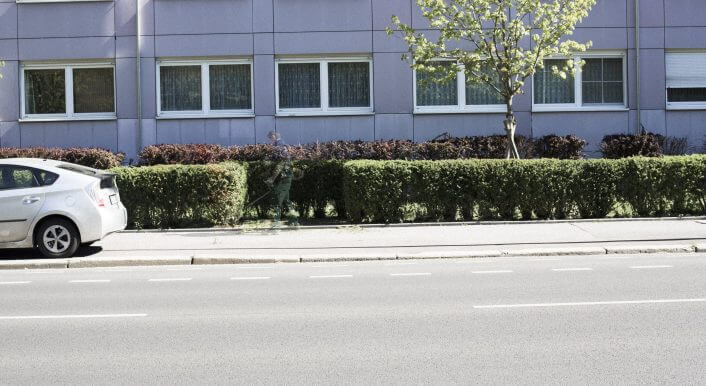Protecting the Social Market Economy
The goal is July 10th. Then the German government will make a decision about everyone who is tolerated in Germany. These are people who were refused the right of residency, but cannot be deported. On July 10th, the upper house of the German Parliament will discuss the draft bill on “Residency Law and Residency Termination”.

In the future, tolerated people should receive the right to stay if they have lived in Germany long enough, earn money and are involved in society. But at the same time, people who are set for deportation should be thrown in jail quicker. Julian Jestadt talked with Christian Klos about tightening the regulations and about why Germany needs a residency law. Klos is the head of division for immigration law at the German Interior Ministry, where the law is being drafted.
Dr. Klos, would you explain why immigration must be regulated?
Dr. Christian Klos: For Germany my answer is the following: because we are a democratic state governed by the rule of law in a social market economy. But all states in the world essentially take on the right to decide who can be in their territory and who cannot. This is derived from state sovereignty. It is also a societal question: who should be part of society and who should not?

Christian Klos
Why do you draw on the social market economy for your answer?
We have a labor market that provides certain forms of protection, such as those related to pensions and health care. These are standards that we seek to provide for the population in Germany. Accordingly, immigration and the social market economy are strongly linked because we also face the question of employment for immigrants. The residency law was created to shape immigration and ensure that we also respect our legal order in regard to foreign cohabitants. Naturally, that also applies to the issue of social security.
During the Annual Meeting on Illegality you made an interesting statement: if we want to find a place in our order for everyone who wants to stay in Germany, then we don’t need the residency law anymore. Does that mean we must expand the existing order to allow for more immigration?
The German parliament is largely free to decide who is allowed to come to Germany; whether we want more immigration and what kind. The scope for decision-making is only very limited in cases where we must observe our humanitarian responsibility as well as international obligations and take in people who have legal reasons for fleeing. To the extent that we can regulate immigration, we need a decision by the state or rather the society on the question of who should come and who can stay. It doesn’t work for people to just say: I’m here now and want to stay.
The Interior Ministry is currently drafting a law and has also presented a draft bill that is being discussed. It promises a reformation of the right of residency for tolerated people. What exactly is this supposed to achieve?
The lawmakers are facing up to reality in regard to the right of residence. There are people who are obligated to leave, but have lived here for many years and have shown significant accomplishments as far as integration goes. In the past, we have tried to solve this dilemma through regulations that set cutoff dates – to assure that illegal immigration would not become more attractive. Now the grand coalition has come to the agreement that in cases of sustainable integration people should have the possibility to receive the right to stay in Germany after eight years – for families even after six years.
Eight years is a very long time.
As mentioned, these are people who are actually obligated to leave. The residency law determines whether someone is allowed to stay or not. If the decision is „no“, then a residency termination must first be achieved. There must be a serious attempt to enforce the law. If this fails in the long term for various reasons, then one must eventually face the new realities and maybe take the step to set aside the obligation to leave and grant the person a residency permit. That has been combined with certain requirements: next to the six or eight years, there must be accomplishments in regard to integration.
The law is also supposed to facilitate imprisonment. The stated reasons almost always apply to asylum seekers who have been turned down. Why is the law being tightened in this way?
The legal position is significantly improved for people who have the right to stay for humanitarian reasons. On the flipside – my minister also always says this (Thomas de Maizière, Christian Democratic Party; editor’s note) – people who do not possess the right of residency in any form must be effectively deported. The draft law does allow detention at short notice if it can be assumed that the person who is obligated to leave will go into hiding before their deportation.
Up to half a million people live in Germany under the radar of the authorities. They count as illegal. How do you counter criticism that such a law would lead more people to hide from the state authorities and be pushed into illegality?
That number seems strongly exaggerated to me. Nobody pushes these people into illegality. The authorities must take care that our regulations in regard to the right of residency are observed. Our courts are then in charge of ensuring that this activity is conducted in accordance with the law. The people who really do not possess the right of residency are initially given a deadline to leave the country voluntarily, this always has priority. If they stay anyway, there must also be the possibility to make it absolutely clear: their stay in Germany will now be terminated.
Around 50,000 people live in Germany who have been tolerated for over three years. These are people who were refused the right of residency. They are caught in a difficult situation: they are not really part of society, but are in the country. In our investigation, we often heard that people shift into illegality at this stage and hide from the authorities. Would it not make sense to find prospects for these people?
With tolerated people, the question of whether they will receive a residency status has already been answered with „no“. These are people who are obligated to leave, but for various reasons the obligation to leave cannot be initially enforced. Beyond that, the status of toleration is proof that the person is known to the authorities and could also receive social benefits for basic provision.
But wouldn’t it be possible to give these people, who have been living with the status of toleration for a long time, prospects to prevent them from going into hiding?
These prospects already exist. There are already various possibilities for leaving a state of illegality in regard to the right of residency. A foreigner who has not created obstacles to prevent them from leaving the country themselves, such as by not revealing their identity, is already supposed to receive a residency permit after 18 months. In the past years, this has allowed around 50,000 people to receive a residency permit out of a state of illegality. Then there is already a right of residency for well integrated teenagers and young people. And also for well integrated and qualified tolerated people to allow for employment. And after various residency regulations with cutoff dates in the past years, there will now be – presumably from the summer – a regulation without a cutoff date, that means it will be permanent. So there are possibilities to move from a state of illegality in regard to the right of residency to a state of legality.
That applies to people who are known to the authorities. Not to those about whom the authorities do not know – and who will not show themselves voluntarily because they fear consequences. Don’t we need possibilities for this?
The least we need to demand is that people register themselves and go to the immigration authorities. Otherwise we really do not know about them and they live in complete illegality. The path always goes through the immigration authority where each individual case can then be evaluated – but these people deliberately avoid that. Maybe someone already fulfills the criteria for receiving the right of residency in Germany? They do then have to face this evaluation. And we can’t take this risk away from anyone. There is no right of residency for everyone in Germany. A person can’t decide on their own in which state they want to live – not anywhere in the world.
Translation: Noah Walker-Crawford
Editor: Florian Bickmeyer
Design: Thorsten Franke, Simon Jockers, Ivo Mayr



